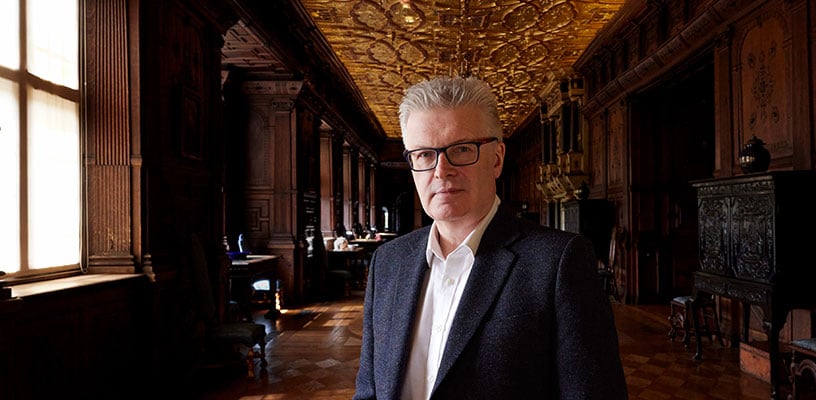James MacMillan creates choral music drama with Hildegard of Bingen

The BBC Singers present the UK premiere of James MacMillan's major choral work, Ordo Virtutum, at the Barbican’s Milton Court on 13 February. The 50-minute score for choir and percussion sets Hildegard of Bingen’s pioneering 12th century text.
As a highlight within its centenary season, the BBC Singers present the first UK performance of James MacMillan’s Ordo Virtutum on 13 February at the Barbican’s Milton Court in London. The choir is joined by members of the National Youth Choir of Great Britain and percussionist Andrew Barclay under the baton of Sofi Jeannin. The performance will be broadcast on BBC Radio 3 on 20 February and will then be available on BBC Sounds.
This major 50-minute score was commissioned by the Mitteldeutscher Rundfunk Choir and was premiered a year ago by them at the Peterskirche in Leipzig. The Leipziger Volkszeitung described how "MacMillan sets the Latin text with echoes of Gregorian chorales, combining them with complexly woven, yet sensually shimmering, at times also overwhelmingly luminous soundscapes."
Ordo Virtutum (Order of the Virtues) is a new setting of the morality play of the same name by the German abbess, mystic and polymath Hildegard of Bingen. Dating from the 12th century, the work is thought to be the first-ever medieval music drama. A shorter version of the Latin text alone appears in Hildegard’s Scivias in which she describes her divine visions, and a longer version with plainchant melodies is contained in her Symphonia armoniae celestium revelationum (Symphony of the Harmony of Celestial Revelations). The songs were thought to be composed around 1151 and the music drama was likely to have been first performed soon after at Hildegard’s recently-founded St Rupertsberg church in the Rhineland by the convent nuns with the community’s provost Volmar perhaps playing the Devil.
MacMillan’s Ordo Virtutum was composed in the pandemic years of 2020/21 for double choir and percussionist and is cast in four parts. In Part 1 the Virtues meet the Patriarchs and Prophets. We also meet the main character, the Soul. In Part 2 the Devil intervenes and tries to win her. Various Virtues confront him. They are Knowledge of God, Humility, Charity, Fear of God, Obedience, Faith, Hope, Chastity, Innocence, Celestial Love, Discipline, Modesty, Mercy and Victory.
In Part 3 they battle for the eternal life of the Soul and in Part 4 eventually overcome and conquer Satan, binding him in chains. Chastity reminds him that she “trod your head underfoot, and in the form of the Virgin brought forth a sweet miracle, wherein the Son of God came in to the world.”
MacMillan’s music throughout alternates between full homophonic and contrapuntal choral textures, the various solo voices, the sound of the Devil who speaks but does not sing and various percussive sounds provided by one player on hand-held crotales, vibraphone, suspended cymbal, floor tom-tom and bass drum.
Further MacMillan highlights this spring include a major US feature in the Twin Cities with a series of concerts in Saint Paul and Minneapolis between 28 March and 6 April co-presented by the Minnesota Orchestra and VocalEssence. The programme includes the North American premiere of The Sun Danced, Woman of the Apocalypse and Seven Last Words from the Cross, together with the premiere of a newly commissioned choral setting of Haec dies.
Nicola Benedetti is soloist in the London premiere of the composer’s Violin Concerto No.2 with the London Symphony Orchestra under Gianandrea Noseda on 3 April. The BBC National Orchestra of Wales presents the world premiere of MacMillan’s new concerto Where the Lugar meets the Glaisnock, composed for euphonium virtuoso David Childs, at Hoddinot Hall in Cardiff on 1 May.
> Further information on Work: Ordo Virtutum
Photo: James Bellorini
